In the eyes of many experienced Pu'er Tea connoisseurs, Yiwu is a place of great charm. People like Yiwu tea for its “aromatic and soft” qualities. But in addition to its “aroma” and “softness,” Yiwu tea has another irresistible appeal—the remarkable transformation it undergoes over time.


Yiwu
When stored properly, Yiwu tea undergoes rapid transformation, with very noticeable aging effects. Over time, the honey-like aroma of Yiwu tea becomes increasingly rich, its strength gradually increases, and its flavor becomes more concentrated. Its aftertaste lingers, embodying the “strength within softness” of Yiwu tea.
Where does this unique charm of Yiwu tea, which is both soft and powerful, come from?
Unique Mountain Environment
Nurturing Prime Tea Areas
Yiwu's Unique Vertical Ecosystem
Yiwu has an average altitude of around 1,400 meters, with an annual average temperature of 17.7°C, and distinct dry and rainy seasons. This vertical ecosystem keeps the tea trees in the Yiwu tea area enveloped in a high-temperature and high-humidity environment year-round. Compared to teas from other production areas, Yiwu tea accumulates internal substances more advantageously.
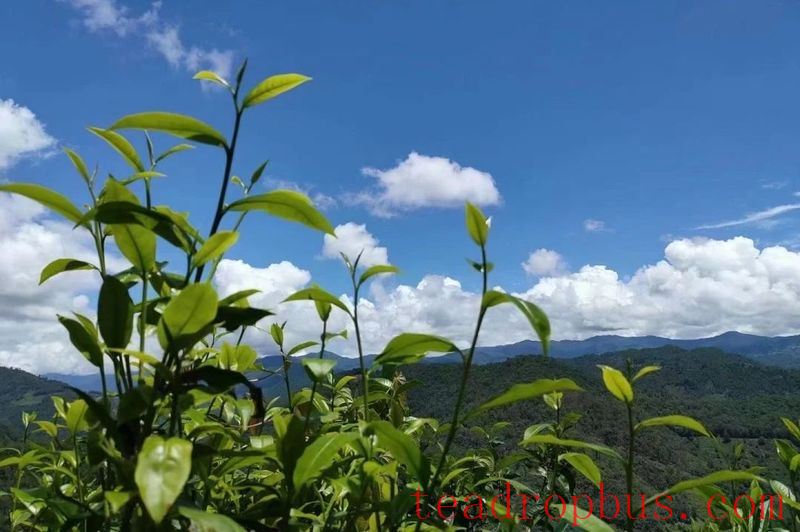
The soil in Yiwu tea areas is mostly slightly acidic red soil and brick-red soil. Compared to other types of soil, red soil has better breathability, adequate moisture content, and faster nutrient accumulation and decomposition. Even under humid and hot conditions, it can provide sufficient nutrients to the tea trees, enabling them to grow deep roots and lush leaves.
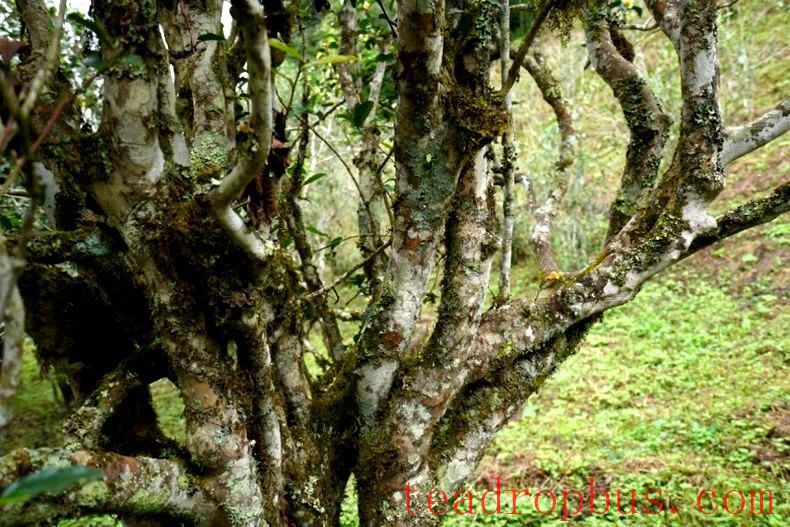
Yiwu tea areas also have a rich biodiversity and high vegetation coverage. Within the same tea field, tea trees coexist with other rainforest trees, and this distinctive vertical ecosystem contributes to the floral fragrance, delicate, and premium character of Yiwu tea.
High Fresh Leaf Tenderness
Due to the superior growth environment of tea trees in the Yiwu tea area, the abundant nutrients in the soil, and the high air humidity, the tea leaves here maintain their tenderness even as they continue to grow. Even when the petioles reach three or four leaves, the leaves remain fresh and not old.
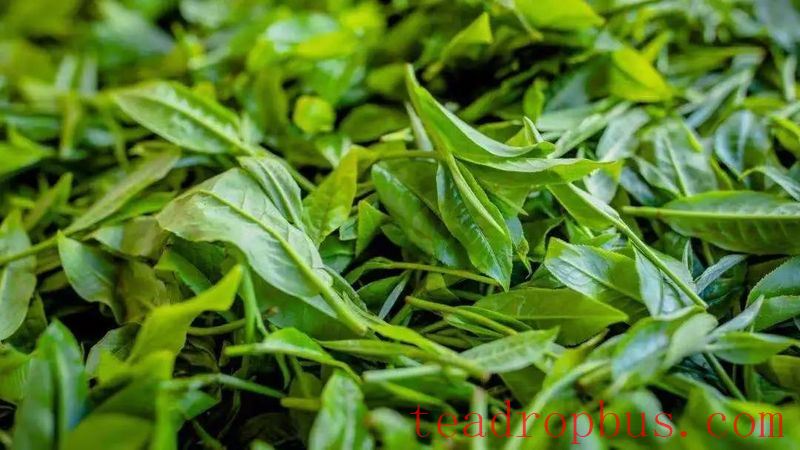
Leaves with high tenderness contain higher levels of water-soluble polysaccharides and pectin in mature leaves and petioles, giving the tea a sweet taste.
With the high tenderness of Yiwu tea and the abundance of internal substances in large-leaf varieties, the transformed Yiwu tea boasts a sweet taste, good harmony, and a rich layering of flavors.
Unique Processing Techniques
Achieving High Transformation
The picking of Yiwu tea is relatively “coarse,” generally harvesting one bud with three leaves and retaining the long petiole, creating tea strips resembling rubber bands. During the wok-frying process of Yiwu tea, early techniques involved using large iron woks, with the temperature controlled at around 280°C. During the stir-frying process, the temperature was maintained at approximately 160-180°C.
To ensure uniform and thorough wok-frying, the time must be well-controlled, and the stir-frying time for Yiwu tea is typically 20 to 25 minutes. During the wok-frying and rolling processes, the buds and leaves must not separate, maintaining the integrity of each tea strip, a lesson learned over many years by the ancestors of Yiwu.
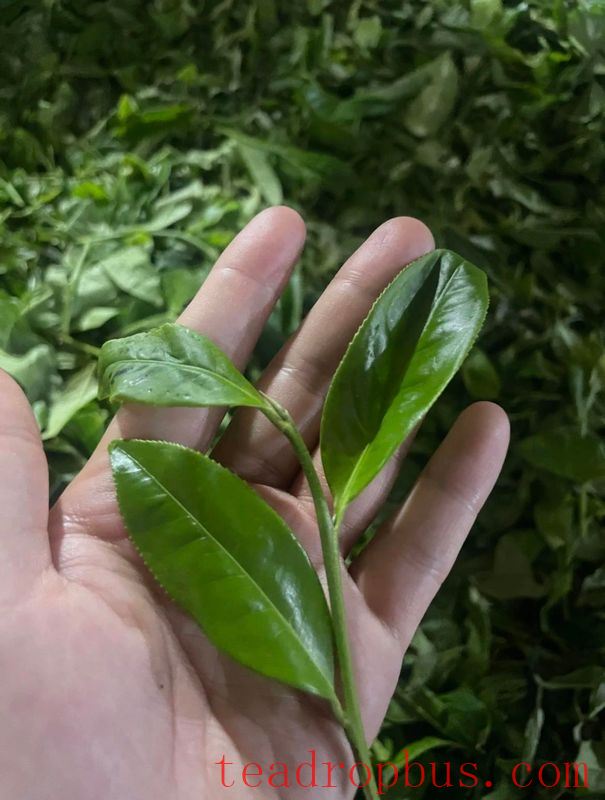
“Throwing the Strips” is another characteristic of Yiwu tea. The rolling of Yiwu tea is light, resulting in a low degree of cell damage, a coarse and loose appearance, and lower compactness. When brewing new tea, the infusion comes out slowly, and it is highly durable. Simultaneously, the coarse and loose appearance is beneficial for oxidation, accelerating the aging process.
Unique Tea Tree Varieties
Source of Core Charm
The unique variety in the Yiwu tea area is called “Yiwu Green Bud Tea.”
Its leaf shape is long and elliptical, with a sharply pointed tip, often referred to as having a long tail. Its serrations are shallow, while those of the Menghai large-leaf tea, Bingdao, and Xigui are deep. Yiwu green bud tea has more downy hair on the back of its leaves, and its tenderness is quite good. It remains tender and supple even when it grows to one bud with four leaves. Therefore, the finished products of Yiwu tea appear to have many thick petioles but are actually very soft and robust.
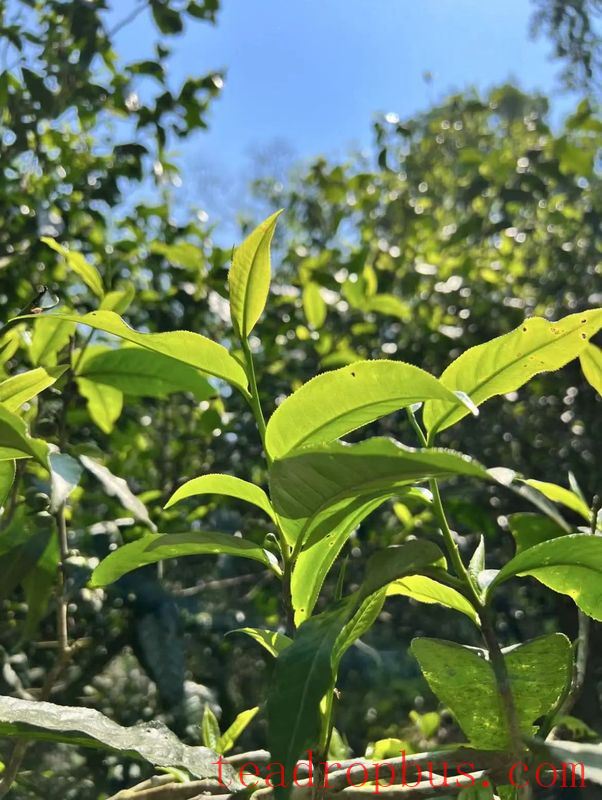
This variety has a water extract content of around 48% to 50%, while a typical variety above 46% is considered high. However, its tea polyphenol content is between 22% and 24%, whereas the tea polyphenol content of most Yunnan large-leaf tea is very high, usually around 30%. In comparison, the Yiwu green bud tea has a slightly lower content than conventional large-leaf varieties, making the produced Yiwu tea aromatic and soft, with low bitterness and astringency and exceptionally high aroma.
The amino acid content of Yiwu green bud tea is also very high, generally around 4.5%, which is very high among Yunnan large-leaf teas (Bingdao is around 4.1%). The Caffeine content of Yiwu green bud tea is also high, usually around 4.1% to 4.2%, compared to the average caffeine content of tea, which is around 3%. Thus, the Yiwu tea we drink is both aromatic and soft, with a bitter base, returning sweetness and salivation, providing a very pleasant physical sensation and ample tea qi.
In summary, the favorable ecological environment, unique variety, and exclusive manufacturing techniques of Yiwu tea bring about a high-aromatic fragrance and a subtle, restrained taste in new tea.
As the aging period increases, the tea soup will become increasingly rich in flavor, a charm that other tea areas can never replicate.
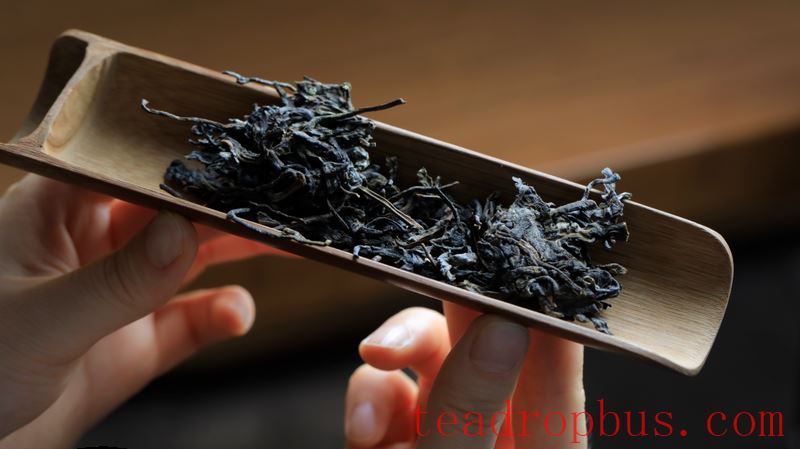
If you want to experience the charm of Yiwu tea as the “King of Aging,” Little Leaf still recommends choosing a more cost-effective method—storing new tea to enjoy aged tea.
